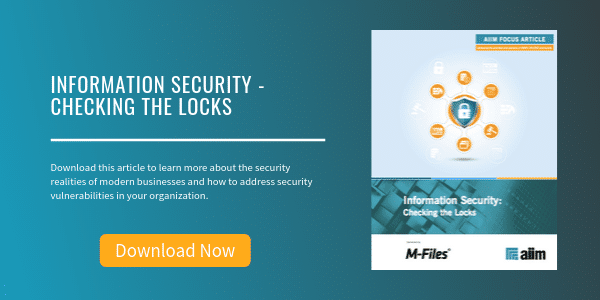
By: Tania Brooks on June 21st, 2018
Infosecurity: Three Industry Trends to Follow
In light of recent events, we can all agree that information security has been criminally overlooked on some major fronts across most industries. Absolutely mind-boggling attacks on major corporations like Sony, Yahoo, and Equifax have consecrated InfoSec in the most frightening way possible. It is entirely possible that InfoSec had been given the resources it needed in those conditional circumstances but, given the unmitigated damage and lack of response, it is beyond fair to say that InfoSec may not have been a high priority. The benefit, if any, of these attacks is that they cemented the need for InfoSec in all businesses of all sizes.
It has, for better or worse, jammed the term InfoSec, short for information security, into our daily lexicons. Inadvertently, this has given the power to the people, so to speak. These attacks have opened our exposure to the possibilities of information security and have driven the idea home that each individual and business is on their own in the digital wild west. Not to fear, there are a few strategies that you can employ to combat the growing wave of malicious hackers. In this article, we will examine certain trends that you should follow in order to secure your data and prevent your privacy from going out of the window.
1. Passwords Are Power
The most important tool you can use in your uphill fight against the endless hordes of hackers is the ever-valorous password. It is a tool that is often overlooked, or ham-fistedly employed. However, a well-implemented password can be your first, and often greatest, line of defense. There is always a password required for most sites, but their requirements do not typically encourage the best practices.
For personal reference, a strong password should always be greater than eight characters, have a mix of alphanumeric characters, must employ both upper and lowercase, and at least one special character. These tips alone are often enough to repel the best brute force attempts and will usually dissuade even motivated hackers. Truly, a good, strong password is not just a good idea or an agitating memo form IT; it is a great way to protect yourself and your business. So many times, a company will have a limp IT security policy based on the false notion that your business won’t be targeted. Optimized company websites with intuitive user logins and strong passwords are just one way to protect yourself.
Unfortunately, that is not the case. Over 80% of all businesses have been targeted and at least that much of individuals. So again, passwords are not something to be shrugged at or done sloppily. In fact, you should make sure that your password is dutifully complex and held in a safe location, either physically or digitally. Do not let your privacy be stolen by a simple password failing in a complex situation; your livelihood may depend on it.
2. Encryption is Key
An increasingly popular solution to the InfoSec problem is simply making your data harder to reach. This tip has been used rather sparingly in the past but is now gaining traction as a legitimate option given the severity and frequency of the attacks. It is a simple solution, comprised of simply password protecting group files and essentially backing up important data onto independent storage drives that are primarily held offline, going online only to back up the data.
While it can be a bear to password protect all the items, it has nevertheless shown to be effective at mitigating intrusion. In other words, encrypting your file systems can prevent a massive amount of damage that would have occurred if not for the encryption process. This should also be used in conjunction with physical encryption that prevents unknown CDs, DVDs, or USBs from being used in protected nodes.
This can be a great tool against physical hacking or social exploiting as they typically rely on vulnerable ports or people with utility access. While it seems like a difficult task, once implemented, it becomes a safety net, of a sort, and will provide a sense of relief as you access your systems without fear of easy intrusion.
3. Use a VPN
A VPN, or virtual private network, essentially simulates a private connection over a public connection. In layman's terms, it allows you to hide your activity and, in some cases, your location as you browse the web or use email. There are a few sites that give you this service for free and some with premium features that can make you a ghost online.
Almost all industries today see the incredible benefit of VPNs as they can obstruct a hacker’s attempt at scanning networks for vulnerable nodes. It goes by the logic that you cannot catch what you cannot see. VPNs are great for business and personal use as they can protect your network information anywhere you go.
Conclusion
The hacking and malicious software industry are not going anywhere soon as the expansion of the internet grants more and more access to potential hackers. These can be offset by simply using a strong password, encryption, and VPN to secure your identity online or otherwise. There is nothing more stressful than having a network that is susceptible to massive data breaching. Protect yourself and others by following these InfoSec industry trends.
Automation in the workplace is already well underway. The McKinsey Global Institute estimates that up to 50% of workplace tasks could be fully automated by 2055, if not before. For employees, this can be a daunting concept, as increased automation in professional settings could lead to job loss on a mass scale.


